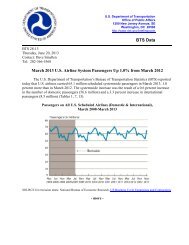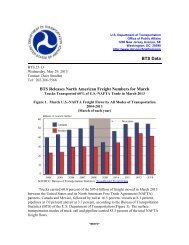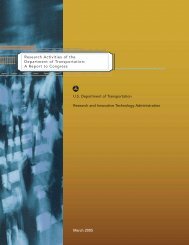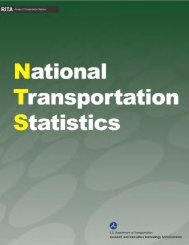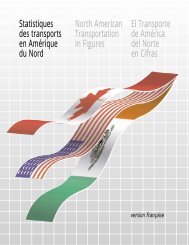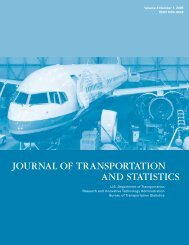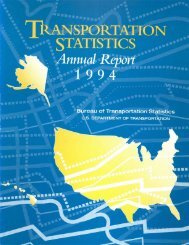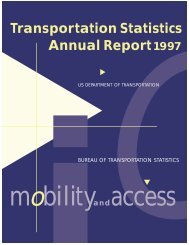table of contents - Research and Innovative Technology ...
table of contents - Research and Innovative Technology ...
table of contents - Research and Innovative Technology ...
You also want an ePaper? Increase the reach of your titles
YUMPU automatically turns print PDFs into web optimized ePapers that Google loves.
90 � Transportation Statistics Annual Report 1996<br />
Quadrillion Btu<br />
25<br />
20<br />
15<br />
10<br />
Oil Dependence<br />
5<br />
�����������<br />
�����������<br />
�����������<br />
����������� ���<br />
����������� ��� ���<br />
�����������<br />
�����������<br />
�����������<br />
�����������<br />
FIGURE 4-2: U.S. TRANSPORTATION ENERGY USE, 1950–94<br />
0<br />
1950 1955 1960 1965 1970 1975 1980 1985 1990 1994<br />
SOURCE: U.S. Department <strong>of</strong> Energy, Energy Information Administration, Annual Energy Review 1994,<br />
DOE/EIA-0384(94) (Washington, DC: July 1995), <strong>table</strong> 2.1.<br />
Around the world, oil consumption has been<br />
increasing in the transportation sectors <strong>of</strong> developed<br />
countries <strong>and</strong> in all sectors in developing<br />
countries (see figure 4-3). The growing dem<strong>and</strong><br />
for oil is increasingly met by the member states<br />
<strong>of</strong> OPEC. OPEC’s share <strong>of</strong> the world crude oil<br />
market increased from a low <strong>of</strong> 30 percent in<br />
1985 to 43 percent in 1994 <strong>and</strong> the first half <strong>of</strong><br />
1995. (USDOE 1995g) By 2000, the Energy<br />
Information Administration (EIA) projects that<br />
petroleum consumption could rise from its present<br />
level <strong>of</strong> 67 million barrels per day<br />
(MMBD) to 77 MMBD, <strong>and</strong> that OPEC’s share<br />
could rise to 46 percent. 2 (USDOE 1995f) By<br />
2010, world consumption is likely to grow to<br />
about 90 MMBD, <strong>of</strong> which OPEC is expected<br />
to supply more than 50 percent. (USDOE<br />
1995e) This would give OPEC members a share<br />
2 EIA defines total petroleum supply to include natural gas liquids, other liquids,<br />
<strong>and</strong> refinery gain, as well as crude oil. In 1993, e.g., crude oil production was<br />
60.1 MMBD, natural gas liquids production came to 5.2 MMBD, <strong>and</strong> total world<br />
petroleum supply was estimated to be about 1.8 MMBD greater than the sum <strong>of</strong><br />
the two.<br />
Petroleum<br />
Other<br />
<strong>of</strong> the world market equal to that which they<br />
held in 1973.<br />
OPEC countries hold the majority <strong>of</strong> the<br />
world’s oil reserves—66 to 77 percent <strong>of</strong> the<br />
world’s proven reserves <strong>of</strong> crude oil (the range<br />
being due to uncertainty about the reserves <strong>of</strong><br />
the former Soviet Union. (USDOE 1995d)<br />
Proven reserves are those recoverable at current<br />
prices using current technology. Considering as<br />
yet undiscovered reserves, the U.S. Geological<br />
Survey estimates that OPEC countries probably<br />
have 55 percent <strong>of</strong> the world’s remaining 1.6 trillion<br />
barrels <strong>of</strong> “ultimate resources” <strong>of</strong> petroleum.<br />
3 (Masters et al 1994; OPEC Secretariat<br />
1995) Today, OPEC nations are producing at a<br />
rate <strong>of</strong> about 1 percent <strong>of</strong> their ultimate resources<br />
per year. The rest <strong>of</strong> the world is drawing<br />
down reserves at twice that rate. Unless<br />
these relationships are changed in a fundamental<br />
way, it seems inevi<strong>table</strong> that OPEC’s market<br />
share <strong>and</strong> market power will exp<strong>and</strong>.<br />
3 OPEC’s own estimates put world undiscovered <strong>and</strong> discovered reserves at 1.5<br />
trillion barrels, <strong>of</strong> which they believe they hold 64 percent.



